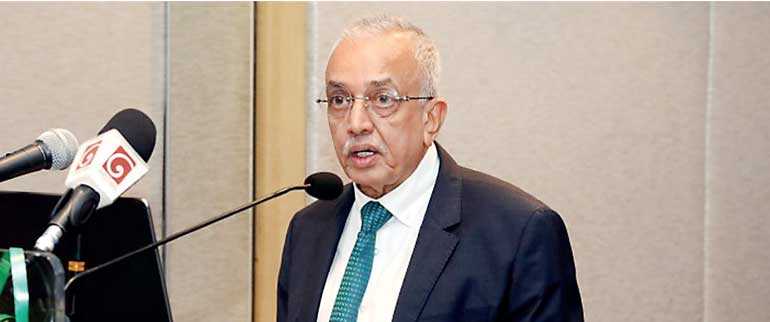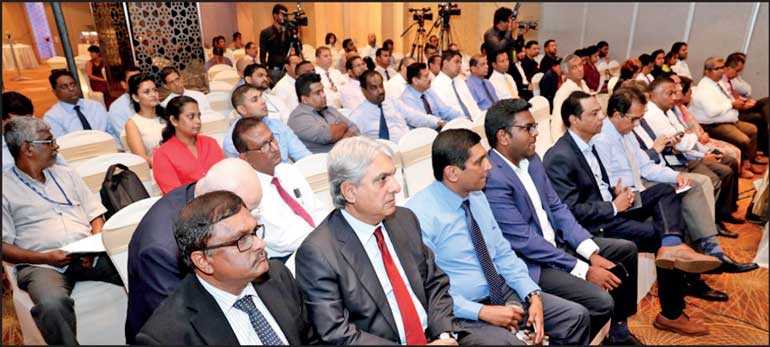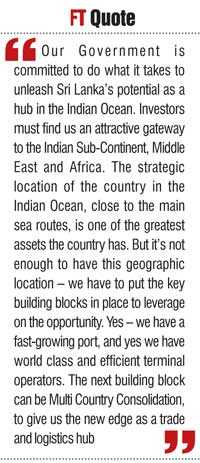Tuesday Feb 24, 2026
Tuesday Feb 24, 2026
Monday, 15 October 2018 01:18 - - {{hitsCtrl.values.hits}}

Minister Malik Samarawickrama
Following is the address by Minister Malik Samarawickrama at the Global Alliance for Trade Facilitation launch of MCC Project on 3 October
Good afternoon, ladies and gentlemen. It gives me great pleasure to be with you today as we launch the Multi-Country Consolidation Project in Sri Lanka, supported by the Global Alliance for Trade Facilitation.
This is a ground-breaking project for our country, and fits in well with the broader initiatives we are working on to position Sri Lanka strongly as a competitive trade hub in the Indian Ocean. I am very happy that the Global Alliance for Trade Facilitation chose Sri Lanka for a project this year.
I believe we are only the second country in Asia, after Vietnam, to be selected for a project by the GATF. This is a testament to the confidence placed in the Government’s reform agenda to shape Sri Lanka into a more trade and investment driven economy, from the previous public debt fuelled growth model.
I have keenly followed the progress of the project and met with various officials in the GATF team over the course of this year – Sean Doherty at the World Economic Forum who are a lead partner in this, Ana Guevara of USAID who are a key funder of GATF, and of course Eric Miller. I have urged them that we move forward soon with implementation, as this is an important and timely initiative for our country.

Multi Country Consolidation refers to the logistics activity where less-than-container load (LCL) cargos from different origins are combined into a full container load (FCL) and shipped to their destinations. It optimises cargo flows and reduces international transport costs for firms. It is especially useful for SMEs that ship small volumes and for large companies that source small volumes of goods from multiple countries or suppliers.
In line with the 4th industrial revolution and the growth of e-commerce and B 2 C trade driven by digital, MCC will be a great boost to Colombo’s attractiveness as a hub for ‘3rd Party Logistics’ or “3PL”. As an exporter myself, prior to entering politics, I know how important it is for exporters to have efficient and cost-effective logistics and shipping services in order to be competitive in the world.

For a country like Sri Lanka – fast becoming an upper middle-income country, and fast losing its low-cost advantages – we need to focus on new sources of competitive advantage - like technology and business efficiency. Time and cost of taking goods into and out of the country, is a key factor in this.
The MCC project will build on the growing competitiveness of the Colombo Port. Alphaliner just ranked Colombo as the fastest growing port in 2018. Colombo is also the only deep-water container port in South Asia that can accommodate large vessels of 18,000 TEUs or more. And in terms of productivity, Colombo’s terminals outperform others in the region – at 35 moves per hour per crane. But we cannot afford to rest on our laurels. Other hubs in the region are forging ahead with reforms and new projects.
For years now we have heard the familiar sentiment that Sri Lanka is primed to be a maritime hub in the region. But we simply haven’t done enough in the past decade or so to actually make this happen. We had postponed much needed reforms. There is a lot of talk about the potential, but not enough on the actual things that we need to do realise this potential.
This Multi Country Consolidation project will be a very specific and impactful initiative that will help to realise this potential. It will complement the other ongoing reforms that we are doing, to make Sri Lanka an attractive place to invest, and an attractive hub for trade.
Guided by the National Trade Policy, the trade liberalisation effort is underway, to bring down para-tariffs and tariffs of imported inputs that are so vital for us to be part of global supply chains.
We are focusing on major improvements to trade facilitation – like a national single window for trade and a new trade information portal.
We have also announced a commitment to liberalise foreign investment in the maritime services sector, and I understand there was a vibrant public private dialogue on this topic yesterday, hosted by the ITC and the Ministry of Finance.
We recently introduced a National Export Strategy to help domestic firms to diversify our product base, with a focus on emerging sectors like IT, the boating industry, and electrical and electronic components. While the four Trade Support Functions – namely, Trade Information & Promotion, National Quality Infrastructure, Innovation and R&D, and Logistics – will create the conditions of success for high potential growth sectors that can create more exporters. The MCC project will complement the National Export Strategy well, as Logistics is identified as one of four important ‘Trade Support Functions’ for exporters.
We are also soon bringing out the Innovation and Entrepreneurship Strategy to foster a climate for new high-tech products and services to emerge and also for startups to thrive. We are also engaging with the World Economic Forum on how to latch on to the opportunities presented by the 4th Industrial Revolution that is totally changing production systems and supply chains.
As the Forum’s founder Klaus Schwab says, “It will no longer be the large fish that eats the small fish, but it will be the fast fish that eats the slow fish.” We might be a relatively small fish, but if we can be fast we can survive and thrive. In this too, MCC will play a key role, as Sri Lanka engages more in the world of e-commerce and digitally-driven supply chains.
In concluding I’d like to reiterate that our Government is committed to do what it takes to unleash Sri Lanka’s potential as a hub in the Indian Ocean. Investors must find us an attractive gateway to the Indian Sub-Continent, Middle East and Africa. The strategic location of the country in the Indian Ocean, close to the main sea routes, is one of the greatest assets the country has.
But it’s not enough to have this geographic location – we have to put the key building blocks in place to leverage on the opportunity. Yes – we have a fast-growing port, and yes we have world class and efficient terminal operators. The next building block can be Multi Country Consolidation, to give us the new edge as a trade and logistics hub.
I urge all of you to come together to make this project a reality and be implemented soon and smoothly. Together with the Ministry of Ports and Shipping and the Ports Authority, my Ministry and I stand ready to support it in any way necessary.
Thank you, and wish you a good evening.